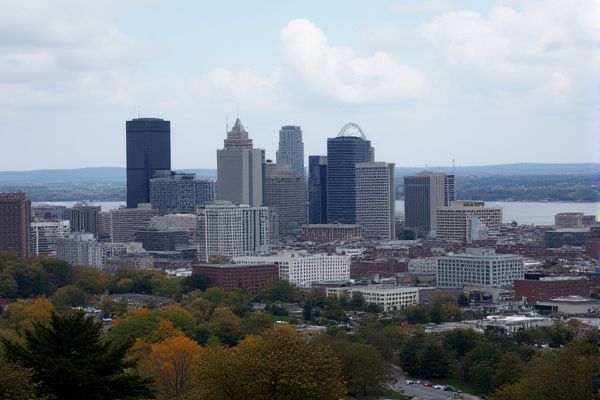
Cost of living in Massachusetts: Higher housing costs, especially near Boston. Utilities: moderate to high expenses. Groceries: above national average prices. Health insurance: costly premiums. Transportation: public transit vs. driving costs. Dining out: pricer than nationwide average. Childcare: expensive services. Property taxes: among the highest. Sales tax: moderate rate. Education: significant tuition costs.
Higher housing costs, especially near Boston.
In Massachusetts, particularly near Boston, housing costs are significantly higher, with home prices 121% more expensive than the U.S. average and the median home sold price in Boston reaching $819,029 as of November 2024, up 3.7% from the previous year. For more details about the cost of living around this region, visit the RentCafe Cost of Living Calculator.
Utilities: moderate to high expenses.
Massachusetts residents face some of the highest utility costs in the country, with the average household paying close to $700 per month, only lower than Connecticut and Hawaii. This is largely due to high energy prices, especially for electricity and heating during cold winters. For more detailed information on this issue, you can visit the article on Massachusetts Utility Costs.
Groceries: above national average prices.
In Massachusetts, the weekly average grocery cost is $271.98, which is above the national average of $270.21, making it the most expensive state for groceries in New England and ranking 14th nationally. The state's unique market dynamics, including a highly fragmented market with many small and medium-sized businesses, contribute to these higher prices. For more information on this topic, visit Fun 107 for detailed insights. This trend underlines the challenges faced by residents in managing their grocery expenses amidst an evolving economic landscape.
Health insurance: costly premiums.
In Massachusetts, health insurance premiums are notably high, with the average monthly premium for single coverage at $715, exceeding the national average of $645. Employees often pay a significant portion of these costs, including high deductibles and out-of-pocket expenses. For more detailed insights on this issue, you can visit the Employer Health Plans section on the Commonwealth Beacon website.
Transportation: public transit vs. driving costs.
In Massachusetts, driving represents a significant expense, with the average motorist spending around $812 on gas alone per year, and overall car ownership costs averaging $1,015 per month. In contrast, public transportation offers a more affordable option, with services like the MBTA's Commuter Rail providing unlimited weekend travel for $10. This highlights the economic benefits of choosing public transit over driving, as detailed on the Massachusetts Average Transportation Costs website.
Dining out: pricer than nationwide average.
Dining out in Massachusetts, especially in Boston, presents a significant expense exceeding the national average. A simple meal at a modest eatery is priced around $18, while a three-course dinner for two at a mid-range restaurant averages about $85. For a slightly more upscale experience, the figures escalate with a dinner for two at a restaurant costing approximately $93. Even a quick meal akin to McDonald's is marked at $11.7. For more detailed insights into the Cost of Living in Boston, these trends highlight the premium placed on dining in Boston compared to other regions.
Childcare: expensive services.
Massachusetts has some of the highest child care costs in the country, with average annual costs for infant care reaching $24,000, and weekly costs for a nanny and babysitter averaging $899 and $195, respectively, making it one of the most expensive states for Child Care Services.
Property taxes: among the highest.
Property taxes in Massachusetts are among the highest, with towns like Longmeadow, Heath, and Wendell having rates ranging from $20.68 to $22.88 per $1,000 of assessed value, funding public services such as schools, libraries, and emergency services. For a detailed look at the Highest Property Tax Rates in Massachusetts, residents and prospective homeowners can gain insight into how these taxes contribute to community resources and local infrastructure.
Sales tax: moderate rate.
In Massachusetts, the sales tax rate is a moderate 6.25%, with no additional local sales taxes, ensuring that the statewide rate remains uniform across all cities and counties. For more detailed insights, you can check the Massachusetts Sales Tax Guide, which offers comprehensive information on the topic.
Education: significant tuition costs.
The average annual in-state college tuition in Massachusetts stands at $29,849 for the 2021-2022 academic year, positioning it as the fourth most expensive state for college education in the United States. Prestigious institutions such as Tufts University and Boston University showcase tuition costs reaching as high as $63,804 and $61,050, respectively. For more detailed information on college costs in Massachusetts, visit the College Cost page. These figures highlight the significant financial commitment involved in pursuing higher education within the state.
